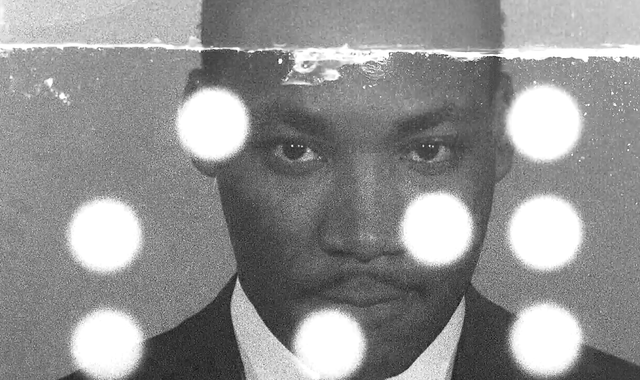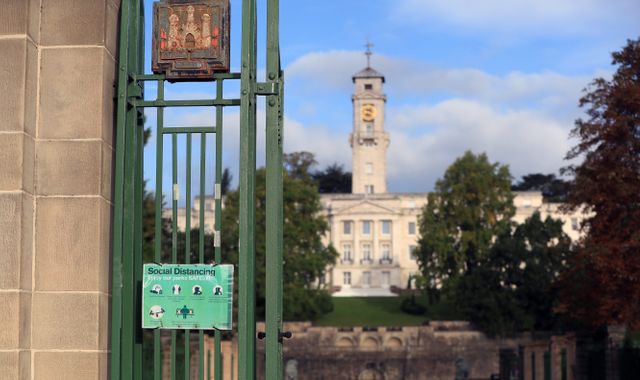MLK/FBI: ‘They thought his illicit affairs would destroy him… but the press wouldn’t touch it’
Written by News on 15/01/2021
Director Sam Pollard grew up in a house with three pictures on the wall – Martin Luther King Jr, John F. Kennedy and Jesus.

Two of those childhood role models made it into his latest documentary, MLK/FBI.
Early influences aside, the Oscar-nominated filmmaker says what’s extraordinary about the film is that it’s centred on information, which by rights, shouldn’t exist.
It draws on recently declassified files, obtained through the Freedom of Information Act and unsealed by the National Archives, to show how King was targeted by the Federal Bureau of Investigation (FBI) throughout the 1950s and 1960s, right up to the day of his death.
Despite King‘s fiercely non-violent approach to protest, the FBI once described him as “the most dangerous black man in America”, noting that he “must be destroyed at all costs”.
Without guns, or access to vast wealth, King relied on the power of belief to change a nation. It was this steadfast faith coupled with his powerful oratory skills that made him so dangerous to the authorities of the time.
Pollard told Sky News: “The idea that this one man could bring together so many people, specifically to the March On Washington, and become the leader of the civil rights movement, had to absolutely frighten someone like J. Edgar Hoover [the director of the FBI from 1935 to 1972], who basically saw America as a white country, which had had black people on the edges.
“All of a sudden here was some black person who was saying, ‘We don’t want to be on the edges, we want to be front and centre. We want to be a part of an integrated world’. And that made him a threat.”
The FBI’s response to that perceived threat was to bug King’s hotel rooms, tap his phones and pay informants to collate vast files of information on his activities and relationships.
His rented rooms were watched to see who came in and out, and adjoining rooms were hired in a bid to record any illicit activity that may have taken place during his stay.
But while the government-approved exercise initially started out as plan to show King to be a communist sympathiser, it soon turned into something much more salacious.
“When they started to wiretap and monitor Dr King and they learnt he was having extramarital affairs, that’s when they switched gears,” Pollard explains.
While King’s long-standing association with fellow activist and lawyer Stanley Levison – a man believed to have strong links to the Communist Party – was the FBI’s justification to monitor calls under cover of national security, that relationship quickly took second place to the newly discovered sexual liaisons.
Pollard goes on: “Basically, they said his connection to Levison and the Communist Party may not destroy him, but his illicit affairs will. And they recorded all these things and passed them on to the American press.”
The documentary shows how the FBI played on negative stereotypes of black men at the time, portraying him as unable to control his sexual appetite, and therefore unfit to be leader of black America.
However, there was a snag. Unlike today, when Pollard says “everything is scandalous and tortured”, it was a time when more risque stories were seen as a liability rather than a scoop.
Pollard explains: “We have to remember, back in the 60s, the American press didn’t dig into people’s personal lives the way we do today, it wasn’t a part of their agenda. It wasn’t something they were going to grab on to, so they all rejected it.
“This made Hoover and William Sullivan [the head of FBI domestic intelligence under Hoover from 1961 to 1971] and other members of the FBI so fearful of King’s impact in America that they will have tried to try to destroy him, as Malcolm X would say, by any means necessary.”
The most explosive moment of that attempt came in 1964 when the FBI sent recordings and a letter to King’s wife claiming to expose his alleged infidelities.
Calling him “a beast”, “a pervert”, “a monster” and “a hypocrite”, the poorly typed anonymous letter concluded with an ultimatum that King “do the one thing left for you to do” – widely understood to be encouraging him to take his own life.
In the documentary, the letter is described by ex-FBI director James Comey as the “darkest part of the bureau’s history”.
:: Subscribe to the Backstage podcast on Apple Podcasts, Google Podcasts, Spotify, Spreaker
Not content with accusations of numerous affairs, drinking and so-called orgies, accusations of King’s supposed presence during an alleged rape further attempted to sully his reputation.
Notes from an audio recording in which King is said to be “looking on and laughing” while a woman is attacked, raise questions due to the visual nature of the description, which appears to rely on sound only.
In the weeks following the letter’s arrival, King is said to have undergone a “real emotional crisis”, during which he became “desperately afraid his sex life would be exposed in raw detail to the American public”.
Despite the FBI’s attempts to expose King as a fraud, using the recordings as evidence, no papers printed the story, his wife stood by him and he was awarded the Nobel Peace Prize later that year.
Away from the now public transcripts, any further analysis of the FBI recordings will have to wait until 2027, when they are due to be made public as part of the MLK Records Act.
As to whether that release will impact King’s legacy, Pollard thinks not: “It’s a different world now and the fact that he had these extramarital affairs, I don’t think you’re going to diminish who he was as a civil rights activist and leader of one of the most powerful movements in the world.”
At a time when society appears more polarised than ever, Pollard believes it will only strengthen existing opinion: “For those who love and revere King, the release of those tapes, if they do happen, won’t mean much. And it won’t change the needle towards King for those who hated him and what he stood for.
“It’ll say to them, ‘We were absolutely correct about who he was. He had this scandalous life. He was salacious, you can’t trust him. He called himself a Christian, how dare he?’.”
However, Pollard says there’s something far more interesting to be revealed in the tapes, if you step away from the tabloid-pleasing allegations of hotel romps and extra-marital affairs.
“In those hotel rooms where [King] was sitting with [activists] like Dorothy Cotton, Clarence Jones, Ralph Abernathy, Andy Young and others part of his movement, he had strategies about how they were going to deal with going to cities like Birmingham and Albany, Georgia, and even Chicago, Illinois.
“You’re going to hear the day-to-day things they had to deal with when they decided to move into a city to break the walls of segregation. That to me is what I’m looking forward to hearing when those tapes are released.”
King, who was known to laugh and joke about the prospect of his death, calling it the “ultimate democracy”, was shot dead on 4 April 1968, in Memphis, Tennessee.
If the recordings are unsealed as planned, they will mark the 50-year anniversary of King’s assassination – a murder which changed the course of history – and like so many of the final years of King’s life, took place while he was under the watchful eye of the FBI.
MLK/FBI is now available on demand, on platforms including Amazon Video, Apple TV and BFI Player.
(c) Sky News 2021: MLK/FBI: ‘They thought his illicit affairs would destroy him… but the press wouldn’t touch it’







